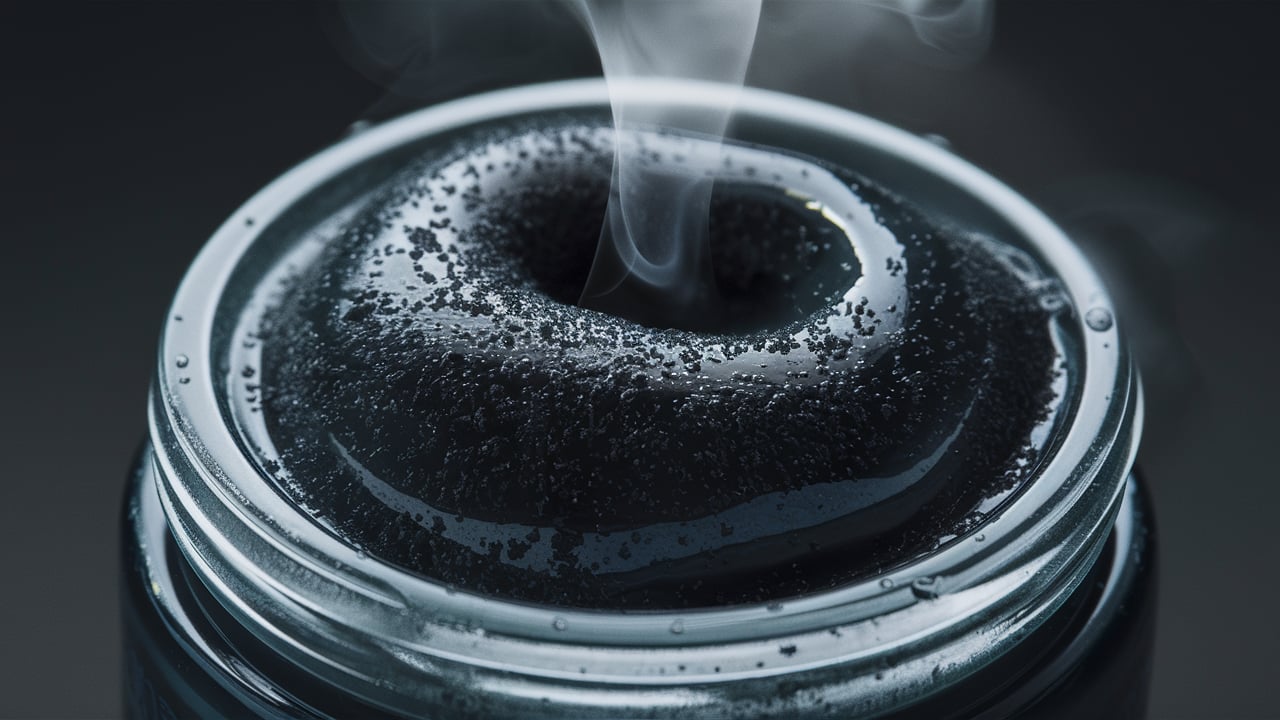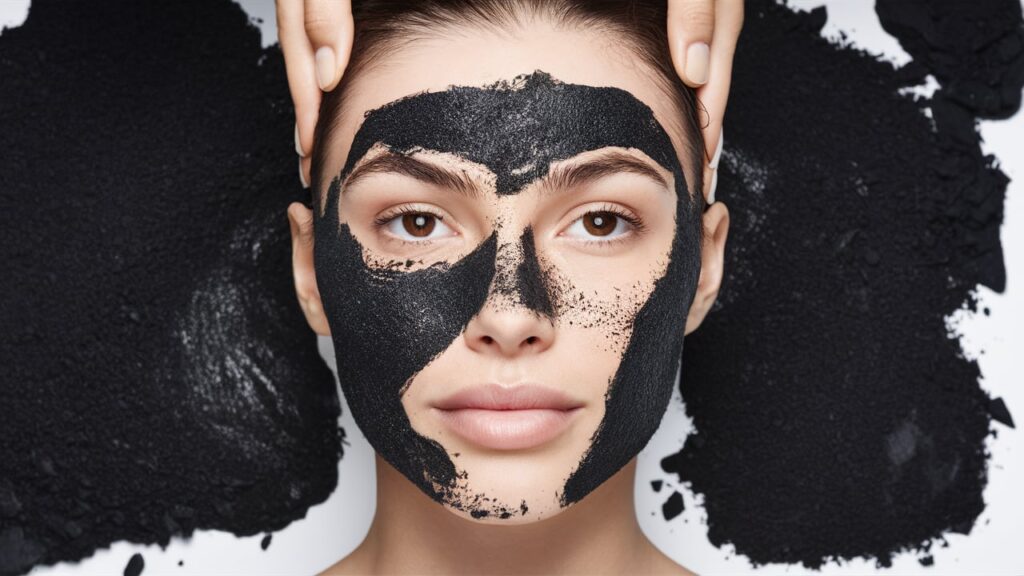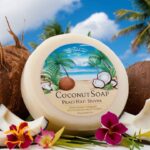Summary: Activated charcoal soap offers numerous skin benefits, including deep cleansing, detoxification, and oil control. It draws out impurities, unclogs pores, and reduces acne, leaving your skin clear and refreshed. Ideal for all skin types, this natural soap provides a gentle yet effective solution for achieving a healthy, radiant complexion.
What is Activated Charcoal?
Activated charcoal is not regular charcoal. It is a black powder made from carbon-rich materials such as wood, coconut shells, or peat.
Activated charcoal is treated at high temperatures to make it highly porous, increasing its surface area.
This porosity allows it to trap toxins and chemicals. As a result, activated charcoal is useful for various purposes, including medical treatments.
People use activated charcoal for teeth whitening and skin treatments, though scientific evidence is limited ➋
Soap Secrets: Why Homemade Soaps Are Your Skin’s New Best Friend
How it’s made and processed
Activated charcoal is made by heating charcoal in an environment without oxygen.
The result is a highly porous activated carbon that can trap chemicals. The process involves two stages:
- heating the charcoal to high temperatures
- activating it with gases like steam or oxygen
Different materials like wood, coal, and coconut shells can be used to make activated charcoal ➊.
How Activated Charcoal Soap Works
Activated Charcoal Soap is a type of soap that includes activated charcoal as a key ingredient.
Activated charcoal works by adsorbing (not absorbing) substances onto its surface over time. This means it traps toxins and impurities from the skin onto its surface.
Activated charcoal bar has a porous structure that increases its surface area for adsorbing toxins. It binds to dirt and oil on the skin, pulling them out and leaving the skin cleaner.
Activated charcoal is also gentle on the skin and can help with a variety of skin issues. It can help unclog pores, reducing acne and blackheads ➋.
Regular soap cleans the skin by reducing surface tension and emulsifying oils, but it may not effectively remove deep-seated impurities.
Activated charcoal soap has a stronger ability to detoxify the skin and may help with specific skin conditions like acne and oily skin.
Benefits of Activated Charcoal Soap
Here are the main charcoal soap benefits:
Deep Cleansing
Activated charcoal is known for its deep cleansing benefits for the skin. It works by attracting and binding to impurities such as dirt, oil, and toxins, effectively removing them from the skin.
Using charcoal soap could therefore help unclog pores, reduce oiliness, and prevent acne breakouts.
- Activated charcoal penetrates deep into pores, drawing out dirt, oil, and other impurities, reducing the likelihood of acne breakouts ➊
- Its absorbent properties help soak up excess oil, which prevents the buildup that leads to clogged pores and spots
- Regular use of activated charcoal can improve skin texture and appearance by removing dead skin cells
- Activated charcoal’s antibacterial properties help inhibit the growth of acne-causing bacteria
Suitable for all skin types
Activated charcoal is generally suitable for most skin types due to its absorbent properties. Charcoal soap helps absorb excess oil, which is beneficial for oily and combination skin.
While it absorbs oil, activated charcoal is gentle enough for even sensitive skin. Overall, activated charcoal bar soap has the potential to benefit most skin types.
Exfoliation
One of the main benefits of activated charcoal soap is exfoliation.
Activated charcoal offers gentle exfoliation due to its physical properties and potential for absorbing impurities.
The fine particles of activated charcoal act as a physical exfoliant. When used in scrubs or masks, the particles gently buff away dead skin cells on the surface.
Activated charcoal’s absorbent nature extends to dead skin cells and other debris on the skin’s surface.
As it absorbs excess oil and dirt, it can bind to dead skin, helping to remove it during rinsing.
By removing dead skin cells, activated charcoal can help improve skin texture and reveal a brighter, more radiant complexion.
The removal of dead skin cells and debris can leave the skin feeling smooth and soft.
Gentle on the skin
The fine particles in activated charcoal can provide a gentle physical exfoliation, removing dead skin cells without being harsh or abrasive.
Compared to some other strong exfoliating ingredients, activated charcoal itself is generally less likely to cause irritation.
Promotes cell turnover
There isn’t conclusive scientific evidence to definitively say activated charcoal directly promotes cell turnover. However, the ingredient can create an environment that might indirectly contribute to a healthier cell renewal process.
As discussed earlier, activated charcoal can gently remove dead skin cells through its physical texture and potential to absorb impurities. This allows for the underlying, healthier skin cells to come to the surface.
Some studies suggest activated charcoal has mild anti-inflammatory properties. Chronic inflammation can disrupt skin health, and reducing inflammation could potentially create a more favorable environment for cell renewal.
More research is needed to fully understand the specific impact of activated charcoal on cell turnover.
Acne Treatment
Activated charcoal soap is a popular choice for acne treatment, but the evidence for its effectiveness is mixed.
Like all activated charcoal products, the soap can absorb excess oil on the skin’s surface.
The soap may help remove dirt, dead skin cells, and other impurities that can clog pores and contribute to acne formation.
Some studies suggest activated charcoal may have mild antibacterial properties. This could potentially help combat the P. acnes bacteria that contributes to acne breakouts.
While there are theories and anecdotal evidence, large-scale studies are lacking to definitively prove activated charcoal soap’s effectiveness in treating acne.
Activated charcoal primarily targets surface-level impurities. It may not be effective for treating deeper acne lesions or cystic acne.

Unclogs pores
The primary benefits of activated charcoal in soap is the ability to absorb excess oil and impurities. This includes sebum (natural oil) produced by the skin and dirt or debris from the environment.
Activated charcoal particles have a slightly gritty texture. While not a harsh scrub, this texture provides a gentle exfoliating effect. The helps remove dead skin cells that can accumulate on the surface of the skin and contribute to clogged pores.
Activated charcoal primarily targets surface-level impurities. It may not be as effective for deeply clogged pores.
Oil Control
Activated charcoal has a highly porous structure with a vast surface area, allowing it to act like a magnet for oil and other impurities on the skin. This includes excess sebum, the natural oil produced by your skin’s sebaceous glands.
By absorbing excess oil, activated charcoal soap can help reduce the appearance of oily sheen on the skin.
While removing excess oil is beneficial for oily skin, do not overdo it.
Over-cleansing with activated charcoal soap can strip away too much natural oil, leading to dryness.
Improves Skin Texture
Activated charcoal soap has the potential to improve skin texture in a few ways.
The charcoal particles have a slightly gritty texture. The particles provide a gentle exfoliating effect, helping to remove dead skin cells that accumulate on the surface.
By removing dead skin cells, activated charcoal soap can help improve overall skin texture and make it appear less dull.
The exfoliating effect of activated charcoal is generally mild. While beneficial, it might not be as dramatic as harsher scrubs.
Anti-Aging Properties
Activated charcoal’s ability to absorb toxins and impurities from the environment can help reduce their damaging effects on the skin. However, research on this specific benefit for skin aging is limited.
The gentle exfoliating properties of activated charcoal can help remove dead skin cells, revealing smoother and potentially brighter skin. This smoother texture might give the illusion of a more youthful appearance.
There’s a lack of strong scientific studies directly proving activated charcoal soap’s effectiveness in preventing or reversing wrinkles.
Anti-aging requires a holistic approach. While activated charcoal soap might offer some benefits, it’s unlikely to be a miracle cure.
Who Should Use Activated Charcoal Soap?
The benefits of using charcoal soap varies based on the specific skin type. Activated charcoal soap can potentially benefit the following;
People Who Can Benefit Most:
Oily Skin:
- Activated charcoal excels at absorbing excess oil, making it a good choice for people with oily or combination skin.
- Acne-Prone Skin:
- Activated charcoal soap might be helpful for managing mild acne. However, it’s not a cure-all and may not be effective for deeper acne lesions.
- People Looking for Gentle Exfoliation:
- The slightly gritty texture of activated charcoal soap offers mild exfoliation, which can help remove dead skin cells.
People Who Might See Less Benefit:
Dry Skin:
- Activated charcoal’s oil-absorbing properties can be drying.
Sensitive Skin:
- While generally mild, some people with sensitive skin may experience irritation from activated charcoal soap.
People with Deep Acne or Skin Concerns:
- Activated charcoal primarily targets surface-level impurities. It may not be as effective for deeper concerns like cystic acne, wrinkles, or hyperpigmentation.
Special considerations
Activated charcoal primarily targets surface impurities. It may not be effective for deeper acne lesions, wrinkles, or hyperpigmentation.
While there are theories about its benefits for acne and anti-aging, strong scientific studies are lacking. It’s unlikely to be a miracle cure.
Alternatives to activated charcoal soap
There are several alternatives to
soap, depending on your specific skin type and concerns.
For Oily/Combination Skin:
- Clay Cleansers:
Kaolin clay or bentonite clay can help absorb excess oil and impurities without being overly drying.
- Salicylic Acid Cleansers:
Salicylic acid is a beta hydroxyl acid (BHA) that can gently exfoliate and unclog pores, beneficial for oily and acne-prone skin.
For Dry Skin:
- Cream Cleansers:
These gentle, creamy cleansers effectively remove dirt and makeup without drying out the skin.
- Micellar Water:
Micellar water is a gentle cleansing option that removes impurities without harsh rinsing.
For Sensitive Skin:
Sensitive Skin Cleansers:
- These fragrance-free, hypoallergenic cleansers are specifically formulated to be gentle on sensitive skin.
Milk Cleansers:
- Gentle and soothing, milk cleansers effectively remove impurities without stripping away natural oils.
For Acne-Prone Skin:
- Benzoyl Peroxide Cleansers:
This ingredient helps kill acne-causing bacteria and may be effective for mild to moderate acne.
- Retinol Cleansers:
Retinol promotes cell turnover and can help unclog pores, potentially reducing breakouts. .
- Sulfur Cleansers:
Sulfur has anti-inflammatory and antibacterial properties that can be beneficial for acne, but it may have a strong odor.
Frequently Asked Questions (FAQs)
What is activated charcoal soap?
Activated charcoal soap is a type of soap that contains activated charcoal as a key ingredient.
Activated charcoal is known for its deep-cleansing properties, as it can adsorb impurities and toxins from the skin.
What are the benefits of using activated charcoal soap?
The benefits of using activated charcoal soap include deep cleansing, detoxification, oil control, acne reduction, pore minimization, and gentle exfoliation.
It can help remove dirt, toxins, and excess oil from the skin, leaving it clean and refreshed.
Is activated charcoal soap suitable for all skin types?
Yes, activated charcoal soap is generally suitable for all skin types.
However, it is particularly beneficial for oily and acne-prone skin due to its ability to absorb excess oil and impurities.
Those with dry or sensitive skin should use it less frequently to avoid potential over-drying.
Can activated charcoal soap help with acne?
Yes, activated charcoal in soap can help with acne. this is according to a research study on costetic uses of activated charcoal.
Its deep-cleansing properties can unclog pores, remove excess oil, and reduce bacteria on the skin, which are common causes of acne. Regular use can help prevent breakouts and reduce the appearance of existing acne.
Can activated charcoal soap be used on the body and the face?
Yes, activated charcoal soap can be used on both the face and the body.
It is effective for deep-cleansing and detoxifying the skin on any part of the body, making it a versatile addition to your skincare routine.
Does activated charcoal soap help with skin conditions like eczema or psoriasis?
While activated charcoal soaps can help cleanse the skin and remove impurities, it is not specifically formulated to treat skin conditions like eczema or psoriasis.
It’s best to consult with a dermatologist for appropriate treatment options.
Are there any side effects of using activated charcoal soap?
Activated charcoal soap is generally safe for most people. However, some individuals with very sensitive skin may experience dryness or irritation.
It’s advisable to do a patch test before using it regularly and to follow up with a moisturizer to prevent dryness.
Can I use activated charcoal soap with other skincare products?
Yes, activated char coal soap can be used in conjunction with other skin care products.
Follow up with a good moisturizer, especially if you have dry or sensitive skin, to maintain skin hydration.
How can I store activated charcoal soap to make it last longer?
To extend the life of your activated charcoal soap, store it in a cool, dry place away from direct sunlight.
Use a soap dish with drainage to keep the soap dry between uses, as excess moisture can cause it to dissolve faster.
Does charcoal soap lighten skin?
No, there is no strong scientific evidence that charcoal soap lightens skin.
While some brands might advertise it for skin lightening, the claims are not substantiated by significant research.
Difference between charcoal and activated charcoal
Here’s the key difference between charcoal and activated charcoal:
Regular Charcoal:
- Production: Charcoal is a basic form of carbon produced by burning wood, plant materials, or even coal in a limited oxygen environment. This process is called pyrolysis.
- Composition: Regular charcoal primarily consists of carbon, but it may also contain some impurities like ash, water, and volatile gases.
- Uses: Regular charcoal has various applications, including:
- Fuel: For grilling or heating
- Metallurgy: In metal production processes
- Art: For drawing and sketching
Activated Charcoal:
- Production: Activated charcoal is derived from regular charcoal, but undergoes an additional “activation” process. This process involves heating the charcoal in a high-temperature chamber in the presence of a gas (like steam) or chemicals.
- Properties: Activation creates a highly porous structure in the charcoal, significantly increasing its surface area. This porous structure gives activated charcoal its key property: adsorption. Adsorption allows activated charcoal to bind to and trap a wide range of molecules on its surface, including:
- Impurities: Like dirt, oil, and toxins
- Gases: Used in air and water purification
- Uses: Because of its adsorption properties, activated charcoal has a wider range of applications than regular charcoal, including:
- Water and air purification: To remove contaminants
- Medical applications: In some cases, to absorb toxins in the digestive system
- Skincare: In products like soap, for its potential to remove impurities
both charcoal and activated charcoal are carbon-based materials.

I’m a devoted organic skincare enthusiast, passionate about the natural, wholesome goodness that organic products bring to our skin.
Organic skincare isn’t just a hobby for me—it’s a lifestyle. Every product I use, recommend, and write about has been carefully chosen for its purity and effectiveness. Everything I write about is backed by scientific studies, dermatologists’ opinions, and user experiences.
I also excel at tackling skincare challenges with innovative, organic solutions.


